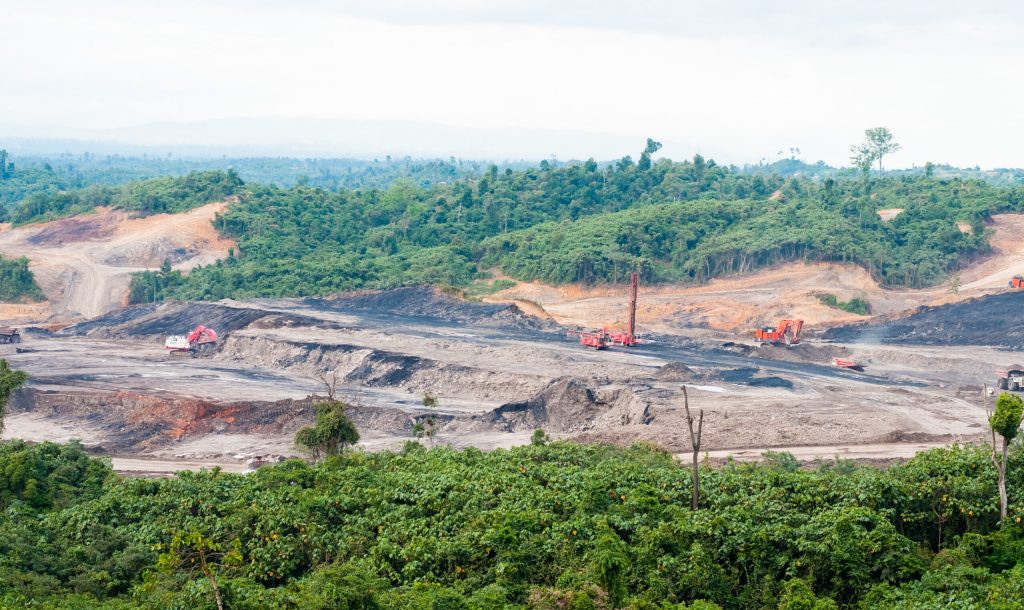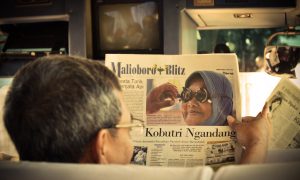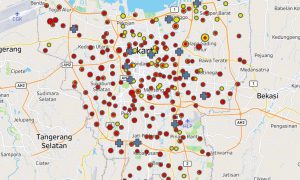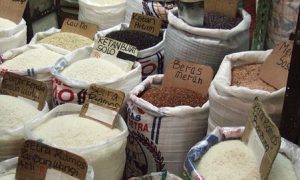In December, Indonesia completed simultaneous elections (Pilkada) in 9 provinces, 224 regencies and 37 cities. Prior to the elections, however, environmental NGOs and activists warned that the fiesta of democracy could accelerate the rate of environmental degradation in the country. As Indonesia’s anti-corruption commission (KPK) and Coordinating Minister for Political, Legal and Security Affairs Mahfud MD has revealed, many Pilkada candidates were sponsored by political financiers. The clientelist nature of post-Suharto regional Indonesian politics has played a crucial role in Indonesia’s alarming environmental deterioration.
Between 2015–18, 3.4 million hectares of land were burned in Indonesia. From 2013 to 2017, 1.47 million hectares of forest were cleared. 82% of 550 rivers in Indonesia are polluted. Despite these disastrous figures, elected leaders are set to implement the controversial omnibus law whose articles and provisions will offer a fast track to deforestation. This is bad news because the regions which took part in the December Pilkada have 60 million hectares of forest (almost 68% of Indonesia’s total forests) and 13.89 million hectares of peatlands (64% of Indonesia’s overall reserves).
Yet environmental degradation and exploitation are not only matters of unwritten concession deals between candidates and big bosses before a Pilkada. Between the elections, as cases in the province of Jambi will show, native oligarchs and unscrupulous security apparatuses from the police to the military (oknum TNI/Polri) continue to exploit natural resources with ease and impunity. To make matters worse, some of these native oligarchs are regarded as local heroes due to their contribution to the villages in which their business activities are located. But the case of Jambi also highlights feasible solutions.
Native oligarchs and Oknum TNI/Polri are major players
In early November of 2020, residents of Air Liki gathered by the bank of River Tabir to pray for the success of a promised road-making project. The dwellers of the mountainous, isolated village of Jambi’s Merangin regency also expressed their most sincere gratitude to Sandri Can Indra (SCI), the project initiator, for his generosity in constructing the road with his own money. SCI is a nearby village head, former would-be regent candidate, and an illegal mining (PETI) oligarch who has businesses operating across Merangin Regency and beyond.
As elsewhere in Indonesia, PETI is an unsolved problem in Jambi that severely destroys the environment while profiting only a few. In many areas of the province, rivers, paddy fields, plantations and forests are destroyed in the process of extracting the gold beneath the soil. This activity is mostly financed by native oligarchs with backing allegedly provided by oknum TNI/Polri. Many lives have also been lost in this business due to minimal protection for mining workers.
Unlike the previously empty pledges of politicians and government officials, the road to Air Liki is really being built. When completed, it will end the decades of isolation lived by Air Liki residents. Currently, the only way for residents to reach the outside world is through the treacherous, rocky Tabir River, which is costly both in terms of time and money. This lack of access is believed to be a major driver of Air Liki residents’ economic underperformance, low education levels and difficulty in accessing proper medical treatment. Residents expect that the completion of the road will be followed by an economic boom, as SCI has hinted at a large-scale expansion of his currently limited mining activities in Air Liki.
Air Liki is located just next to the Kerinci Seblat National Park, partially explaining why Indonesia’s Ministry of Environment and Forestry seemed reluctant to give a green light for a road project once initiated by the Merangin government. But SCI went ahead, framing his million-rupiah project as fulfilling the Air Liki residents’ unheard wish. Yet the truth is the road is not funded by SCI’s personal wealth, but by his company, Genting Barat Jaya Corporation. The primary reason of the road-making, as my interview with an excavator driver employed by SCI revealed, is to smoothen the flow of logistics for SCI’s PETI business in Air Liki. It has been difficult for SCI to transport oil in drums as well as other necessary equipment for large-scale mining operations to Air Liki, due to the small size of available boats and the unpredictable current of Tabir River.
It remains to be seen what the future holds for the Air Liki residents, as well as their vast areas of pristine forest and crystal-clear river. But examples from other remote, resource-rich villages in Jambi, including those in my district, Sumay, are not so pleasant. The construction of roads in these regions was followed by uncontrolled deforestation which enriched a handful of native oligarchs, but led to wide-ranging socioeconomic conflicts, displacements of indigenous people and the influx of outsiders.
It is highly likely that the road to Air Liki will serve as strategic capital for SCI to dominate the natural resources of Air Liki against his competitors. Such an infrastructure privatisation strategy is already in place in Mangun Jayo in Bungo regency, where a native oligarch and former vice regent owns a road and a bridge. The bridge is locked and village residents must get permission if they want to drive over it. The infrastructure has proven effective in safeguarding the oligarch’s monopoly over the natural riches of Mangun Jayo and nearby areas. In Mangun Jayo, like SCI, the oligarch is seen as a hero.
While native oligarchs play a significant role in environmental degradation by privatising public infrastructure, oknum TNI/Polri also facilitate the illegal oil drilling industry in Jambi’s Batanghari regency. Miners can exploit oil reserves with ease inside and outside protected forests because they are regularly alerted by rent-seeking police and military officers before raids are held. An oil truck driver once told me that the transportation of oil passes without serious trouble as most police officers in Jambi know the ‘big brothers’ possessing the oil. When stopped, he just tells the police to talk to his high-ranking security apparatus boss on the phone—and the problem is solved instantly.
Feasible solutions are available
One morning in 2004, the mosque’s drum (bedug) in Teluk Langkap, my village, rang with an unusual sound. The sound was called tabuh larangan, played on emergency occasions only. Within minutes, hundreds of my fellow villagers rushed to the river Batanghari with any weapons they could get. They launched simultaneous attacks at some 40 mining vehicles owned by village oligarchs and a locally born military officer which had been in operation for two days. The miners ran away, some of them were beaten badly by the mad, unorganised villagers.
The villagers’ fury originated from concerns that illegal mining would and had polluted their beloved river, whose water they regularly use for multiple purposes. They also feared that the river brink would collapse, ruining their houses and sole mosque. In addition, older members of the community deemed the untouched, large gravel island in the village as sacred. Opposition was supported by an emerging educated class in Teluk Langkap who acted as pro-environment intellectual actors.
Since the fierce conflict, there has never been illegal mining activities anywhere in my village, even though the price of rubber (a major income source) has fallen dramatically, the economy has been destroyed by the COVID-19 pandemic and two elections have been held.
Jambi also provides a second example of villagers collectively working to preserve environmental resources. In May this year, 5 villages in Jambi’s Bujang Raba mountainous region received 1 billion rupiah from the REDD+, a scheme developed by parties to the United Nations Framework Convention on Climate Change (UNFCCC) aiming to reduce emissions from forests while creating financial value for the carbon stored in them. The money was given to compensate the villagers’ success in preserving the 5.3 hectares of their locally managed forests (hutan desa). Since 2015, Bujang Raba villages have taken part in a voluntary carbon market with the help of an environmental NGO.
The success stories of Teluk Langkap and Bujang Raba villages offer precious lessons for Indonesia that environmental degradation and exploitation can be halted through people power. However, this power is subject to various factors such as the unity of local communities, including whether village elites are themselves involved in mining or forest businesses. Another crucial prerequisite for effective local resistance is that the object of exploitation needs to be regarded as common property whose very existence is vital to the daily activities and survival of local villagers. In Teluk Langkap, the River Batanghari is the main source of water for locals, not least for those residing on the river bank. The high dependence of Teluk Langkap residents on the Batanghari made them adamant to protect it, with PETI elites and village head candidates understanding that any future mining activities will rehearse the bloody tragedy of 2004.
As for the Bujang Raba case, it is noteworthy that granting villagers autonomy to take care of their forests proved effective in preserving the environment, while also generating income for village inhabitants. Such a preservation mechanism is indeed in line with the historical record of the village’s residents who have co-existed with nature harmoniously for centuries. They do not regard rivers or forests as commodities, but as inseparable parts of their lives. Only a tiny minority of greedy village elites see natural resources through a commercial lens. Locally autonomous forest management as applied in Bujang Raba should widely be implemented in more of Indonesia’s regions.
This does not mean that the autonomous forest management schemes are without challenges. Hutan desa are prone to elite domination and cooptation, especially in conditions where local residents do not have stable income. In such cases, they will likely seek ways to make use of the forest or consider offers coming from wealthy individuals in exchange for concessions. Empowering the local economy must always be on the agenda and the active presence of environmental NGOs is unquestionably vital.
Environmental degradation and exploitation are not unique to Pilkada, but are recurrent challenges that persist in the interim between the intense bargaining and concessions leading up to elections. Nonetheless, the province of Jambi has a history of practical solutions that provide a potential blueprint for Indonesia to deal with its chronic environmental issues.
 Facebook
Facebook  Twitter
Twitter  Soundcloud
Soundcloud  Youtube
Youtube  Rss
Rss 


